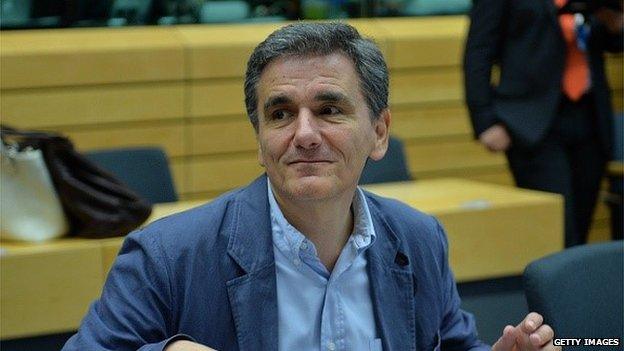Athens: 'Creditors trying to discredit our offer'
- Published
- comments

Greece's new finance minister Euclid Tsakalotos at Tuesday's Eurogroup meeting
Athens is putting on a brave face in public for today's negotiations to secure a last minute rescue deal.
But privately the government is not exactly bullish - as shown by this private briefing for ministers and their aides which I've obtained.
It says:
"Dear all,
"As you know the eurogroup is over and again there were leaks saying that the Greek side did not produce any proposals. This is the same argument as when the Greek government had tabled the 47-pages proposal or when it came back on Monday the week before the referendum...
"It seems that they simply do not like the proposals, once again, and they look for the (same) way to discredit them."
So that doesn't sound as though a new dawn of mutual entente between the administration of Mr Tsipras and other eurozone governments has dawned yet.
However this briefing also maps out the way forward. It says:
"In any case, tomorrow there will be a new eurogroup by teleconference.
"Just a while ago PM Alexis Tsipras spoke on the phone with USA President Obama to inform him on the Greek proposals; now there is a meeting amongst Tsipras, Hollande and Merkel and a bit later the foreseen Summit.
"Also, as you all probably know by now, PM Alexis Tsipras will be tomorrow morning in Strasbourg to address the plenary and this has been decided just a while ago."
So the talking continues. And helpfully I've been passed a copy of the core principles for a rescue agreed by Mr Tsipras yesterday with leaders of the other main political parties.
It takes the form of a letter from the President of the Greek Republic, Prokopis Pavlopoulos, to the prime minister of Poland Donald Tusk, this term's president of the European Council.
Here is the letter:
"Dear Mr. President,
"I would like to inform you that following a request by the Prime Minister of Greece Mr. Alexis Tsipras, I called a meeting yesterday of the political leaders of the Parties of the Greek Parliament, in which a common declaration was adopted by all Parties except the Communist Party of Greece stating the following:
"The recent vote of the Greek people in the referendum does not constitute a mandate to break away from the Euro zone, but a mandate to continue and strengthen the effort for attaining a socially just and economically viable agreement. The Government will assume the responsibility of continuing negotiations, and every political leader will contribute to this effort on the basis of their institutional and political role.
"The common goal, in this context, is the pursuit of a solution that will ensure:
Covering, sufficiently, the financial needs of the country
Credible reforms, based on a fair distribution of burdens and the promotion of growth, with as few recessionary consequences as possible
A strong, front-loaded developmental program, primarily oriented to confronting unemployment and encouraging entrepreneurship
A commitment to beginning a substantial discussion on confronting the problem of the viability of Greek public debt
"The Political Leaders also underlined that the restoration of liquidity in the Greek banking system, in coordination with the ECB, constitutes an immediate priority.
"The aforementioned consensual decision of most Greek Parliamentary parties constitutes a crucial opportunity for all euro zone partners to reach an economically and politically viable agreement."
What this means in practice, according to a separate government briefing, is that Mr Tsipras stands by the letters he sent a week ago to the country's creditors setting out the €30bn of additional loans the country needs over the next three years to pay maturing debts, amending the creditors proposed pension and VAT reforms, and asking for investment from the pool of money created by Jean-Claude Juncker, European Commission president.
Mr Tsipras also wants a writedown of the country's massive debts - equivalent to 180% of GDP or national income - and a resumption by the European Central Bank of life-or-death emergency lending to banks.
Or to put it another way, very little of substance has changed in the Greek position over the last few days.
Which is why the German chancellor Angela Merkel is not exuding optimism that a way can be found to avert the catastrophe of the collapse of Greece's banking system, and its exit from the euro.